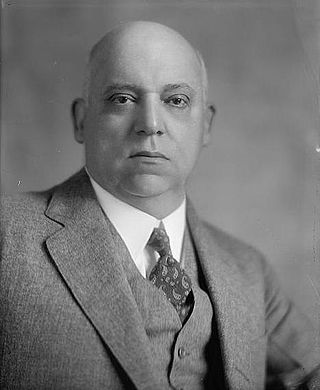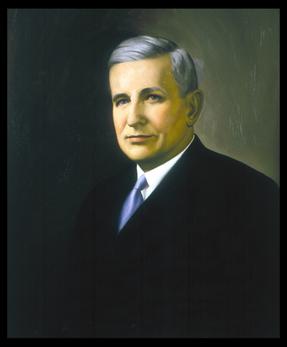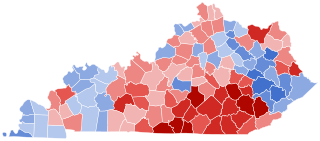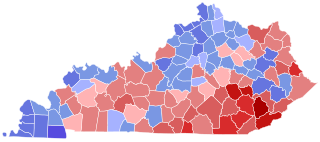
The governor of the Commonwealth of Kentucky is the head of government in Kentucky. Sixty-two men and one woman have served as governor of Kentucky. The governor's term is four years in length; since 1992, incumbents have been able to seek re-election once before becoming ineligible for four years. Throughout the state's history, four men have served two non-consecutive terms as governor, and four others have served two consecutive terms, the most recent being current governor Andy Beshear, who was re-elected to a second term on November 7, 2023. Kentucky is one of only five U.S. states that hold gubernatorial elections in odd-numbered years.

Julian Morton Carroll was an American lawyer and politician from the state of Kentucky. A Democrat, he served as the 54th governor of Kentucky from 1974 to 1979, succeeding Wendell H. Ford, who resigned to accept a seat in the U.S. Senate. He was most recently a member of the Kentucky Senate, representing Anderson, Franklin, Woodford, Gallatin, and Owen counties. He was the first Kentucky governor from the state's far-western Jackson Purchase region. Thelma Stovall, who served as lieutenant governor with him, was the first woman to be elected lieutenant governor of Kentucky.

The Tennessee General Assembly (TNGA) is the state legislature of the U.S. state of Tennessee. It is a part-time bicameral legislature consisting of a Senate and a House of Representatives. The Speaker of the Senate carries the additional title and office of Lieutenant Governor of Tennessee. In addition to passing a budget for state government plus other legislation, the General Assembly appoints three state officers specified by the state constitution. It is also the initiating body in any process to amend the state's constitution.

John Crepps Wickliffe Beckham was an American attorney and politician who served as the 35th governor of Kentucky and a United States senator from Kentucky. He was the state's first popularly-elected senator after the passage of the Seventeenth Amendment.

James Bennett McCreary was an American lawyer and politician from Kentucky. He represented the state in both houses of the U.S. Congress and served as its 27th and 37th governor. Shortly after graduating from law school, he was commissioned as the only major in the 11th Kentucky Cavalry, serving under Confederate Brigadier General John Hunt Morgan during the American Civil War. He returned to his legal practice after the war. In 1869, he was elected to the Kentucky House of Representatives where he served until 1875; he was twice chosen Speaker of the House. At their 1875 nominating convention, state Democrats chose McCreary as their nominee for governor, and he won an easy victory over Republican John Marshall Harlan. With the state still feeling the effects of the Panic of 1873, most of McCreary's actions as governor were aimed at easing the plight of the state's poor farmers.

Ruby Laffoon was an American attorney and politician who served as the 43rd Governor of Kentucky from 1931 to 1935. A Kentucky native, at age 17, Laffoon moved to Washington, D.C., to live with his uncle, U.S. Representative Polk Laffoon. He developed an interest in politics and returned to Kentucky, where he compiled a mixed record of victories and defeats in elections at the county and state levels. In 1931, he was chosen as the Democratic gubernatorial nominee by a nominating convention, not a primary, making him the only Kentucky gubernatorial candidate to be chosen by a convention after 1903. In the general election, he defeated Republican William B. Harrison by what was then the largest margin of victory in Kentucky gubernatorial history.

The Kentucky House of Representatives is the lower house of the Kentucky General Assembly. It is composed of 100 Representatives elected from single-member districts throughout the Commonwealth. Not more than two counties can be joined to form a House district, except when necessary to preserve the principle of equal representation. Representatives are elected to two-year terms with no term limits. The Kentucky House of Representatives convenes at the State Capitol in Frankfort.

John White Stevenson was the 25th governor of Kentucky and represented the state in both houses of the U.S. Congress. The son of former Speaker of the House and U.S. diplomat Andrew Stevenson, John Stevenson graduated from the University of Virginia in 1832 and studied law under his cousin, future Congressman Willoughby Newton. After briefly practicing law in Mississippi, he relocated to Covington, Kentucky, and was elected county attorney. After serving in the Kentucky legislature, he was chosen as a delegate to the state's third constitutional convention in 1849 and was one of three commissioners charged with revising its code of laws, a task finished in 1854. A Democrat, he was elected to two consecutive terms in the U.S. House of Representatives where he supported several proposed compromises to avert the Civil War and blamed the Radical Republicans for their failure.

Augustus Owsley Stanley I was an American politician from Kentucky. A member of the Democratic Party, he served as the 38th governor of Kentucky and also represented the state in both the U.S. House of Representatives and the U.S. Senate. From 1903 to 1915, Stanley represented Kentucky's 2nd congressional district in the House of Representatives, where he gained a reputation as a progressive reformer. Beginning in 1904, he called for an antitrust investigation of the American Tobacco Company, claiming they were a monopsony that drove down prices for the tobacco farmers of his district. As a result of his investigation, the Supreme Court of the United States ordered the breakup of the American Tobacco Company in 1911. Stanley also chaired a committee that conducted an antitrust investigation of U.S. Steel, which brought him national acclaim. Many of his ideas were incorporated into the Clayton Antitrust Act.

The Arkansas State Senate is the upper branch of the Arkansas General Assembly. The Senate consists of 35 members, each representing a district with about 83,000 people. Service in the state legislature is part-time, and many state senators have full-time jobs during the rest of the year. During the current term, the Senate contains twenty-nine Republicans and six Democrats.
The Constitution of the Commonwealth of Kentucky is the document that governs the Commonwealth of Kentucky. It was first adopted in 1792 and has since been rewritten three times and amended many more. The later versions were adopted in 1799, 1850, and 1891.

The Utah State Legislature is the state legislature of the U.S. state of Utah. It is a bicameral body, comprising the Utah House of Representatives, with 75 state representatives, and the Utah Senate, with 29 state senators. There are no term limits for either chamber.

John Young Brown was an American politician from the U.S. Commonwealth of Kentucky who represented the state in the United States House of Representatives and served as its 31st governor. Brown was elected to the House of Representatives for three non-consecutive terms, each of which was marred by controversy. He was first elected in 1859, despite his own protests that he was not yet twenty-five years old, the minimum age set by the Constitution for serving in the legislature. The voters of his district elected him anyway, but he was not allowed to take his seat until the Congress' second session, after he was of legal age to serve. After moving to Henderson, Kentucky, Brown was elected from that district in 1866. On this occasion, he was denied his seat because of alleged disloyalty to the Union during the Civil War. Voters in his district refused to elect another representative, and the seat remained vacant throughout the term to which Brown was elected. After an unsuccessful gubernatorial bid in 1871, Brown was again elected to the House in 1872 and served three consecutive terms. During his final term, he was officially censured for delivering a speech excoriating Massachusetts Representative Benjamin F. Butler. The censure was later expunged from the congressional record.

Simeon Slavens Willis was an American attorney who served as the 46th Governor of Kentucky, United States, serving from 1943 to 1947. He was the only Republican elected governor of Kentucky between 1927 and 1967.

William Justus Goebel was an American Democratic politician who served as the 34th governor of Kentucky for four days, having been sworn in on his deathbed a day after being shot by an assassin. Goebel is the only sitting state governor in United States history to die by assassination.

The following table indicates the party of elected officials in the U.S. state of Kentucky:

The 1899 Kentucky gubernatorial election was held on November 7, 1899, to choose the 33rd governor of Kentucky. The incumbent, Republican William O'Connell Bradley, was term-limited and unable to seek re-election.
Taylor v. Beckham, 178 U.S. 548 (1900), was a case heard before the Supreme Court of the United States on April 30 and May 1, 1900, to decide the outcome of the disputed Kentucky gubernatorial election of 1899. The litigants were Republican gubernatorial candidate William S. Taylor and Democratic lieutenant gubernatorial candidate J. C. W. Beckham. In the November 7, 1899, election, Taylor received 193,714 votes to Democrat William Goebel's 191,331. This result was certified by a 2–1 decision of the state's Board of Elections. Goebel challenged the election results on the basis of alleged voting irregularities, and the Democrat-controlled Kentucky General Assembly formed a committee to investigate Goebel's claims. Goebel was shot on January 30, 1900, one day before the General Assembly approved the committee's report declaring enough Taylor votes invalid to swing the election to Goebel. As he lay dying of his wounds, Goebel was sworn into office on January 31, 1900. He died on February 3, 1900, and Beckham ascended to the governorship.

William O'Connell Bradley was an American politician from the state of Kentucky. He served as the 32nd Governor of Kentucky and was later elected by the state legislature as a U.S. senator from that state. The first Republican to serve as governor of Kentucky, Bradley became known as the father of the Republican Party in Kentucky.

The 2022 Kentucky General Assembly was a meeting of the Kentucky General Assembly, composed of the Kentucky Senate and the Kentucky House of Representatives. It convened in Frankfort on January 4, 2022, and adjourned sine die on April 14, 2022. It was the third regular session of the legislature during the tenure of governor Andy Beshear.





















